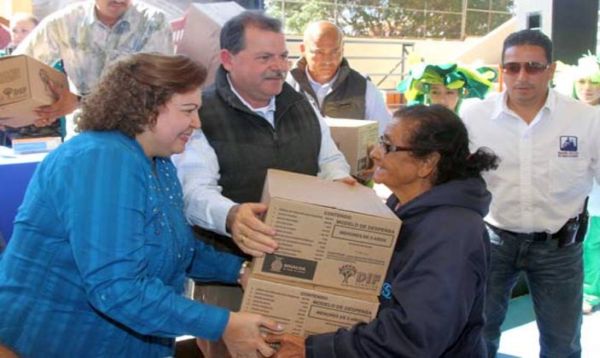Mazatlán, Mexico - In the United States, most government aid takes the form of in-kind transfers: that is, the government gives you stuff, or a voucher to buy specific stuff, rather than just cash to buy whatever you like. That has led to a panoply of programs — food stamps, housing assistance, Medicaid, insurance subsidies — that are each focused on a particular purpose.
But there's only value in giving people, say, food rather than money if they wouldn't have used the money to buy food anyway. And a new study suggests that when people in Mexico got cash rather than food aid, they spent it on... food.
In the study, Naval Postgraduate School's Jesse Cunha looks at the Mexican government's food assistance program, known as Programa de Apoyo Alimentario (loosely translated to Food Aid Program, or PAL). "Participating households receive monthly transfers (trucked into the villages) consisting of ten common food items, such as corn flour, beans, rice, oil, and powdered milk," Cunha explains. "Eligibility for the program was determined through a means test, and take-up among eligible households was virtually universal."
During the program's rollout in 2003, the government did an experiment in 200 villages where households eligible for the program randomly received "either the in-kind food transfer, an unrestricted cash transfer, or no transfer." Evaluating the experimental data, Cunha finds that "both cash and in-kind transfers increased total consumption relative to no transfer, and that effect sizes are indistinguishable from one another."
In other words: if you just give people cash, they still buy as much food as they would have gotten had you given them food instead.
So the two approaches work just as well as each other, right? Nope. While in kind and cash transfers caused equivalent increases in consumption, people using their own money bought different things than those in the food basket. The basket contained powdered milk, for example, whereas only 18 percent of people receiving the cash transfer consumed powdered milk at all.
There are two possible interpretations here. One is that the government is misidentifying what food people want and thus wasting money that could be better spent by the people themselves. The other is that the government is steering people toward better foods. But there's cause for skepticism there. Cunha does find evidence that consumption of micro-nutrients like vitamin C and zinc is higher for mothers and children getting the food than those getting the cash, but no evidence of differences in actual health.
And there's another big drawback to giving food rather than cash: it costs more to administer. Cunha notes that distributing PAL's in-kind transfers costs about 20 percent of the cost of the food, but that the distribution costs of Mexico's main cash transfer program, Progresa-Oportunidades, amount to 2.4 percent of the cash distributed.
That's a gigantic difference in administrative costs. It implies that if one were to allocate $1,000 to an in-kind program, $833.33 would go to actual food, whereas an $1,000 cash program would be able to distribute $976.56 — 17 percent more.
Of course, this is only one study, but it adds to a growing pool of evidence that cash transfers actually aren't "wasted" on frivolous things and do improve poor peoples' lives in observable ways.
Original Story


